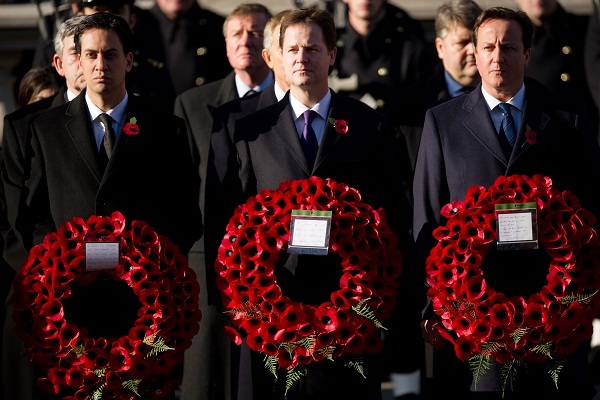The politics of poppy-wearing shift slightly each year. The unofficial rule used to be that poppy-wearing began at the start of November. In recent years this has crept forward further and further into October, largely, I think, because of politicians and the BBC.
The BBC lives in terror of someone appearing on one of its programmes without a poppy and thus sparking a round of ‘BBC presenter in poppy snub’ stories in the papers. If you appear on the BBC during this period you will find people on hand to pin a poppy on anyone not already sporting one. To my mind this slightly misses the charitable, not to mention voluntary, purpose of the exercise.
But politicians have also fuelled this poppy mission-creep. Each year they begin to wear their poppies earlier. This too has a motivation. I suspect it is that if a politician wears a poppy early enough then the happy day may arrive when they will be seen wearing a poppy while their political opponent stands poppy-less. Thus they can imply, if never actually say, that their opponent is less supportive of the armed forces than they are. Ed Balls seems to have been wearing one for weeks. Again, this does not seem to me the ideal motivation for wearing a poppy.
Which brings me to my point. We treat our military appallingly in this country. We pay them abysmally. We frequently misuse them abroad. Even apart from what we expect of them there, we also use them as an extra emergency-service at home. Last summer, when a private company looked set to make the Olympics a security disaster, thousands of soldiers had their leave cancelled and were bussed in to provide additional security for the Olympics. They did so not only superbly, but uncomplainingly.
Our military are worse paid than any other publicly-funded profession. Yet, unlike every other part of the ‘public sector’, they never protest about not receiving an above-inflation pay-increase or their ungenerous pension plan. Despite being expected to fight, kill, die and police the quarter-finals of the table-tennis, nobody in power ever seems to suggest that our soldiers actually get a proper pay-rise.
Every year when this time comes around I wonder if there is not a collective – and in particular a political – guilty conscience at work here. Is the reason why the politics of poppy-wearing becomes slightly more febrile and ostentatious each year caused by the fact that we all know that this country treats its armed forces abysmally, and in the back of our minds we know that putting some money in a box and pinning a poppy on our chest once a year does not quite make up for this fact?







Comments